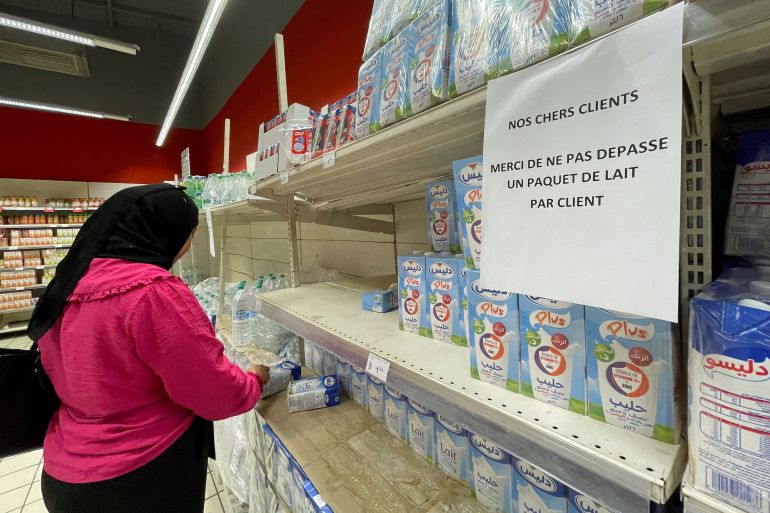As elections approach, Tunisian market shelves are still bare
Food shortages have been ongoing for months in Tunisia, another sign of the country’s economic crisis, and the government’s seeming inability to solve it before Saturday’s elections.

Tunis, Tunisia – Ilyes, a local handyman looks right then left and asks in a whisper: “Do you want milk? I can get you milk,” in the slightly shady way someone might attempt to sell a more unsavoury product.
Procuring butter, however, is much harder. Ilyes sucks air over his teeth: “That’s difficult,” he says shaking his head. “Milk’s all finished for today but I can get you some tomorrow,” and the deal is sealed.
Keep reading
list of 3 itemsTunisians protest against Saied ahead of parliamentary elections
Tunisia law failing to protect women from domestic violence: HRW
Packs of butter are barely seen on supermarket shelves and the once butter-laden croissants that Tunisians love are now labelled as made with margarine. For the well-off artisanal butter is available for 13 Tunisian dinars ($4.1) per 200g, about three times the usual price.
Half-fat milk is subsidised for the consumer, but farmers are not supported, and the national cattle herd has been dwindling over recent years.
President Kais Saied has previously blamed speculators for the food shortages, but his opponents say he is to blame for failing to revive the country’s economy, ahead of parliamentary elections on Saturday. Most of the opposition will be boycotting, saying the vote is illegitimate.
Shortages ‘recurring theme of life’
Coffee is the lifeblood of Tunisians, but, without milk, cafes often only serve black coffee.
Radhouan, who works in a leading chain of coffee merchants, said: “We’re having problems with the classic blend because of the Office of Commerce, they’ve only imported 60 percent of what the country needs and this has to be shared with every cafe and shop in the country”.
The regular coffee used in cafés is subsidised, and all coffee is purchased by the state. But with the state’s foreign currency reserves running low, that is impacting imports.
Coffee merchants rely on the state’s Office of Commerce to facilitate most imports, while separately paying for special items such as new blends from Peru and Bolivia.
“Now we are having problems with importing these new varieties, because of the Office du Commerce,” says Radhouan, as he rolls his eyes and tuts.
Food, medicine and fuel shortages have been a recurring theme of Tunisian life throughout 2022. Many people are angry that after promising so much, Saied has concentrated on political changes – such as bringing in a new constitution – rather than finding economic solutions to their most pressing needs.
The toxic combination of rapidly rising inflation and the global financial crisis is hitting Tunisians across the class divide.
Bab Souika, a usually bustling popular neighbourhood with a traditional market bordering the old medina of Tunis, seems less crowded these days.
Butchers are only able to sell cheap cuts of meat, while spice shops festooned with dried red peppers are still filled with canned and dried goods that few people are purchasing.
Fishmongers no longer sell prime fish like sea bass, instead resorting to small fish that people can afford. Where the market opens out onto Halfaouine Square, at the feet of the Saheb Ettabaa Mosque, are fruit stalls selling spoiled apples instead of the fresher fruit that was previously available.
The story is similar at the supermarkets. The shelves at the local branch of Aziza, a homegrown supermarket chain, seem perennially bereft. Supermarkets up and down the country have gaping holes on their shelves where products used to be. On this aisle, it is the fizzy drinks that are no longer available.
Mohammed, a shelf-stacker at Aziza, looks at the labels to remind himself what was there.
“I’m not sure why there’s no soda pop, I don’t know, there’s lots of products missing, like rice and tea and coffee,” Mohammed says, pointing to another gap on the shelves. “But it’s not just missing products, it’s the prices, look at that bottle of oil, 1.8 litres it’s 18 dinars now ($15.7), it was seven ($2.2) or eight dinars ($2.5) before, it’s more than doubled.”
Rising inequality
The food shortages, and the increase in prices, have highlighted the ever-increasing disparity between the rich and poor in Tunisia.
In La Marsa, one of the city’s richer suburbs, luxury cars still can still be seen tearing up the highway past hoardings advertising luxury developments for the well-heeled to invest in.
For those with money to spend there is no shortage of luxury imports of foie gras and trendy new health foods, sold at many times the European retail prices.
While the rich experiment with black quinoa and tofu, for the poor, a plate of pasta in tomato sauce has become a rare treat. The disparity between rich and poor is stark and it is clear that some people are doing well while others go hungry.
“Meskeen (poor) Tunisia,” laughs Fatma, a shelf stacker at a city branch of Monoprix, a French supermarket brand. “We’ve no deliveries of milk scheduled, I can’t remember when we last had butter and now we are running low even on canned tomatoes, what next?”